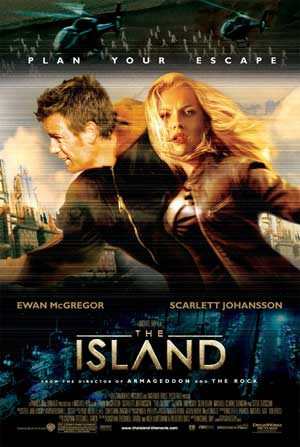 Note from Devin: While I was away in California for San Diego Comic Con, two important junkets happened in New York City. I reached out to some of the great local journalists to pitch in, and so we’re able to bring you coverage of both The Island and Bad News Bears.
Note from Devin: While I was away in California for San Diego Comic Con, two important junkets happened in New York City. I reached out to some of the great local journalists to pitch in, and so we’re able to bring you coverage of both The Island and Bad News Bears.
When actress Scarlett Johansson joined director Michael Bay in giving an interview for The Island, it didn’t seem the pairing would work. Originally the interview was scheduled with Johansson and her co-star Ewan McGregor talking to journalists here, but he was working in London, so Bay sat in and the director and star provided a show of the dynamic between the two.
Though Johansson has been known for starring in quirky small-scale character driven films films (such as Ghost World, Lost In Translation and The Girl with the Pearl Earrings), Bay had been established as a provider of splashy explosion and car crash laden action flicks with scant story or characterization beyond stock figures such as Armageddon.
Nonetheless, the two have come together in a film with both challenging ideas (what if we could make clones to extend life through organ-harvesting) and emotionally engaging characters (two clones – McGregor and Johansson – fall in love and escape). And they came together her to provide an insight into their caeers and the making of this intriguing film.
Q: Michael, this is not just an action film–there is a real character based story here–have you have mellowed a little bit in your style?
MB: I am not just one of those directors that sits in my trailer; I actually don’t even use my trailer…
SJ: We are convinced that he never goes to the bathroom. It is unbelievable he never leaves the set…
MB: No I don’t that is how I get my creative energy. I am just involved with setting every shot, how we light it, how we are going to block the extras to everything. This thing is wilted; we need another one – that is where I get my creative juices. The way…I arrived at the set probably 45 minutes to an hour after the crew has been there because I don’t want to see the crew get their breakfast burritos when I get there I want to shoot and I am like that through the whole day and I like to shoot fast because fast gives me more time to improvise with actors and like. After Scarlett and Ewan did that scene where they are talking in the Skim Bar and Scarlett walks away I said–it was kind of a play on words with the actors–but I said “Let’s shoot this scene using the word you just learned ‘dude’ all right because it was a joke on me because I call everyone “Hey dude” or “dude, dude, dude, don’t do that” or…”Dude has 13 different meanings.” So it was a joke on me. Ewan’s little girl was saying daddy does Michael Bay call you dude?
SJ: It is hard though, It is really hard because some of the days we have are really long and I would look at Michael and say “I can’t do it again, I can’t” but he was very good about that, he was very sensitive and would go “Just one more, just one more. I know you can do it.”
MB: You sometimes really have to weld that energy especially when you are doing action because to get them in that moment just for a few seconds, if you are not up and trying to give them as much as you can, you are not going to get that tension you need, especially in action stuff.
Q: This film contrasts sharply with your others—how difficult was it to decide to do this action adventure film?
SJ: I wasn’t difficult; it was very easy. Every film I have done is very different and I am constantly playing different characters with different kinds of directors. I love genre films, if they are good, they do the trick, and you are removed from your life for a couple of hours; I had just never found one that I thought was good enough you know. You figure if you are going to do an action film, or a thriller or a science fiction film, it had better be the right one because it is not like you can do tons of them. And of course when I heard that Michael was attached to it, it became very interesting to me because he does it so well. He is one of about two or three people that can do it really right. So I figured if you are going to do it you may as well do it right. So it was easy for me, I was working on Match Point in London and they were shooting in a month and I said sign me up, it was very easy, no turmoil.
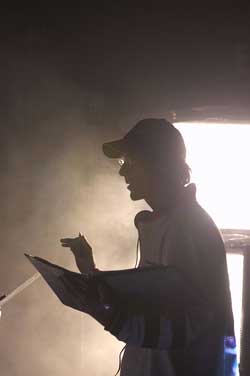 MB: Until we met.
MB: Until we met.
Q: What appealed to you about this role?
SJ: It was just a really fantastic script–exciting, adventurous, and fun. You know of course when you are reading a script and it says slides down a drain pipe or something you don’t actually think that is ever going to happen until 7.30 in the morning on the day when Mr. Michael Bay says just slide down this drain pipe and then we will do it again from another angle and again from another angle. So it was a lot of work, as far as playing a character that was kind of innocent it was delightful, it was really fun because as an actor, mentally you get into this state of everything being so new–children, dogs, people, cars feeling in love and physical intimacy and all of these things being so brand new so it manifests itself physically so you get excited and Ewan and I really had a fun time with that, it was very sweet.
Q: Michael, this is your first film with the DreamWorks team and not produced with Jerry Bruckheimer. How different was the experience and what’s your current relationship with Bruckheimer?
MB: I have no relationship with Jerry! No. I’m very good friends with Jerry and I miss Jerry. But I walked into a studio meeting and I met with five people. There was Steven Spielberg, Walter Parkes, Laurie MacDonald, Adam Goodman and Marc Haimes. I walked out of there and realized, “Oh my God, that’s a studio. They actually make movies.” So many studio heads don’t understand how to make movies. It’s a more intimate studio. They’re very supportive. DreamWorks is very supportive of making the script right. They gave me a lot of free rein. So I really enjoyed it. A very funny story, though: when Steven called me to direct this script I said “Okay,” and so the rumor got around town. Jerry called me up. It was like small talk for about 15 minutes. He was at the Super Bowl. I got ready to hang up and he goes, “So I understand you committed to something.” “No, no. Jerry, I’m just thinking about it.” “Well, I just want you to know we passed on the script.” Apparently he ripped his office apart the next Monday, OK. Anyway. I’m going to go back to Jerry.
Q: This film hits on touchy subject matter such as cloning, stem cell research, abortion, and class conflict. Can you comment on that?
MB: What I really intended was that when the audience leaves, I want people to think, “Would you, if you could, have a clone?” What I was telling some other reporters earlier was if there were a facility like this I’m sure there enough selfish people in this world that would want to do this. It’s a universal thing, the theme in this movie–that we all want to live longer. It’s just how far will you go? It’s not just a comment on stem cell research. We did a lot of studying. I met with several stem cell researchers and it’s amazing how they feel they can cure so many diseases. This is just taking cloning in a sci-fi way to the nth degree. It’s just to open discussion, that’s it.
Q: Scarlett, are you surprised at just how fast you’ve achieved such success in Hollywood? And do you read about yourself in the tabloids?
SJ: Yeah, it’s very surprising. I never had any expectation. I only hoped that and thought when I was younger that I’d like to be a working actor for… forever. But I don’t think you can foresee something like this, something like this meaning kind of the hype or success or the fact that Michael could see me outside of a certain category and say, "She’s a young ingénue and has done some more alternative films." The fact that he could see me in this was very surprising. It was lovely. It was very nice. As an actor you see yourself in different kinds of roles. You imagine that you can play them. But it’s not always that way looking at it from an industry point of view. I really don’t patronize tabloid magazines, so if I ever read what’s written about me it’s either hearsay or maybe somebody has faxed me the article or something like that. But I don’t think it really does any good. I never respond to any of those things, true, not true, whatever. I find it’s better to avoid it because then you won’t have to be correcting it in the next week’s tabloids. And so you just sort of let it take its own course, unless it’s horribly and unbelievably untrue and offensive.
Q: What was it like working out the bits with two Ewans–jerk Tom, and naïve and likable Lincoln?
MB: Actually, it was [Ewan’s] idea to have a Scottish accent. I thought it was a great idea. We actually loved shooting Tom Lincoln because he was such an asshole. He was so selfish and Ewan just said, “He is so much fun, to play that guy.” That’s the reason why I chose Ewan, because of his boyishness. It’s kind of like a Nic Cage thing. Nic is another actor that you can see that boyish wonderment, and I thought that was really crucial for the role.
SJ: And if you see him in Guys and Dolls, you just see how versatile he really is. It’s amazing. I felt so proud of him because he’s incredible. He’s a triple threat, you know what I mean? Singing, dancing, acting. Everything.
MB: He really is a serious actor. He really is. He’s a consummate pro.
Q: There was a “Star Wars” moment in this movie with planes flying about and the zinging around did you discuss that with Ewan and did he a react.?
MB: Well it is funny the first time I met with Ewan was in New York. The first question he asked ‘Are you going to do a lot of blue screen?’ I said no I would actually like to shoot a lot of stuff real and live. We shot 2 days of blue screen, but I must say Ewan is a very good blue screen actor, he really is. No seriously acting with a blue screen is very tough, wouldn’t you say?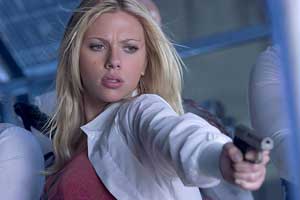
SJ: It is sooo exhausting.
MB: It is exhausting and there is nothing to draw from it is really, really tough.
SJ: Yeah it really is, especially when you are imagining that you are trying to escape to save your own life and you can hear the grip chewing a sandwich next to you, really, it is hard.
Q: Since you were filming in London recently, is it going to be different now after what has happened with the bombing–are you worried or concerned about it?
SJ: No, of course not. London is a lovely place to be, it is as safe as any and you know the show must go on everybody is trucking along. We are shooting in Central London this week and will be for the rest of the show and I am staying there you know. I was here when September 11th happened and it was amazing the unity the people had and how wonderful the police and fire departments were and the same in London they were so fast acting. That alone is enough to make you feel ok. That threat is everywhere you go so it is important to not let it change your life.
Q: Scarlett, can you talk about the physical challenges on this film, and were there any near-misses as far as the action scenes?
SJ: Yeah, I almost lost an eye. That was fun. I had a permanently blue knee. That was pretty gross. The problem is that once we were doing this scene where I had to crawl on the sidewalk. There was so much action going on in the background. We were in the foreground and in the background it’s like a car comes in, the SWAT team gets out, there’s an explosion, and things are going on. What happened was I fell to my knees and in that instance I was like, ‘Oh, that hurt so badly!’ I had to keep crawling because the scene is so organized. It takes 20 minutes to put it all back to place. The first A.D. is screaming at everybody to get in their places and you just can’t take that time. So you just kind of go through it in agony. And the eye, almost losing my eye, that was really a drag.
Q: How did that happen?
MB: It was one with the wasp [the dual seat jet flyer].
SJ: Did you see the playback of that?
MB: Yeah, I did.
SJ: It was so gross.
MB: They’re riding the wasp through the building. There was a hydraulic ramp under the slider device.
SJ: And we weren’t harnessed into this wasp.
MB: Ewan’s cajones. He said, ‘Michael when the ramp went off it was a little harder than we intended.’ And it hurt Ewan’s cajones and it threw Scarlett forward and she hit her head, unfortunately
SJ: It was very close to my eye.
MB: But she’s tough. I’ve got to tell you, she really is tough.
SJ: Thank you.
MB: She was hanging up on that [big red] R, 30 feet up, on a wire. You were a sport, I must say, because that was scary up there.
SJ: I wasn’t so (scared). Ewan was so freaked out that I was going to fall that my knuckles were bleeding from his fingernails. I’m saying, ‘Why are you still holding me? I’m attached to this harness.’ And he was like, ‘I can’t let go. It’s my human instinct. You’re gonna fall.’ It was really funny. He hated it up there. It was very sweet. At least losing my eye came in time for the holiday season, so I didn’t have a giant lump for the film. I just had it over the holidays. Lovely.
Q: Scarlett, were you jealous that Ewan got to play this other character and meet his sponsor? And would you like to play a dual character at some point?
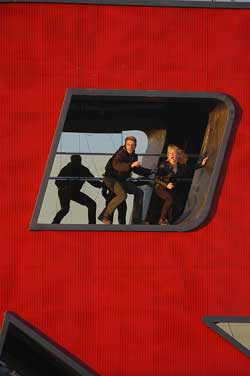 SJ: Who knows?! If it wasn’t too unbelievable. But he definitely had a great time with it. It was so fun to watch. Ewan was so funny in that scene because we all hated that character so much. He was so vile and so creepy. It was very funny. And I loved acting with him as that character as well because he was so, so leachy and gross. But [she’d play such a role] only if it were to come up in some kind of realistic [way]. I could never think of a scenario. But it seemed like a good time.
SJ: Who knows?! If it wasn’t too unbelievable. But he definitely had a great time with it. It was so fun to watch. Ewan was so funny in that scene because we all hated that character so much. He was so vile and so creepy. It was very funny. And I loved acting with him as that character as well because he was so, so leachy and gross. But [she’d play such a role] only if it were to come up in some kind of realistic [way]. I could never think of a scenario. But it seemed like a good time.
MB: In the original script, her character was pregnant and it was too woe is me through the whole story.
SJ: I was also asthmatic. It was a real drag.
MB: You were. It was a drag through the whole movie. And she actually did meet her sponsor.
SJ: And my name was Esther.
Q: Michael, you produced The Amityville Horror and Texas Chainsaw Massacre remakes. Some would say you have a fixation with the 1970s. Is that true? This movie also seems to be a throwback to Logan’s Run and THX-1138 as well. Are you going to keep The Transformers movie from being a Toho giant robot movie?
MB: That’s a lot of information in the question. Whoa-ho. That’s a half-hour answer. I’m not stuck in the 70s. Those are just movies that I produced because I like helping first-time directors break into the business and I think they’re interesting movies to bring back to the younger generation. Your second question: is this movie a throwback to THX or Logan’s Run? You know, there are certain themes that are relatable in this movie and in those. When you see THX you want to shoot yourself. I just think it’s so oppressive. I wanted to make this, at least in the world we call Centerville, more fun and a little bit quirky. And Transformers…
Q: Are you doing that?
MB: Well, we’re working on it. We’re designing right now and working on the script.
Q: What will we see on the DVD?
MB: Scarlett naked!
SJ: The personal home video collection.
MB: There are some missing scenes. Literally, I just finished the movie 48 hours ago, so there’s a lot of chaos in my head right now. I don’t know what missing scenes we’ve got. It’s also just how we did certain things. We’ve got a lot of video documentaries on the set, stuff like that, going into more detail about stuff.
SJ: We traveled a lot. We went from Palm Springs to Detroit. We were in Nevada and then California. So there was a lot of footage of them following us all around the place. It was fun.
Q: Since you started so young, if you had a clone, what sort of career would have the clone do in lieu of your acting career? And how did you enjoy seeing Steve Buscemi again?
SJ: Oh, it was great. I love Steve. He’s so, so, so funny and he’s such a great actor. He cracks me up. It was really great to work with him again and I hope we get to work together again sometime in the future. And I’d just have her (the clone] do simple household tasks, folding the laundry; maybe prance around in clothing so I could see what I might look like. You know, do the grocery shopping, change the toilet paper, things people just don’t like to do.
Q: So you wouldn’t have her lead an alternate acting career so you could switch back and forth?
SJ: No, I’d rather use her for my own selfish control.
Q: Who’s the person you turn to for advice in general?
SJ: My mother. My mom has seen every single movie ever made, ever. She’s a library of film; she’s unbelievable. She could be a film historian; I swear. She knows a lot about film and has incredible taste. She also happens to be just absolutely adorable, lovely, caring and liberal. And…I trust her. And she trusts me. So it really makes for a nice professional and personal relationship. She wants me to do what makes me happy. That’s all you can ask for is your parents’ support, and she’s lovely that way.
Q: With everything going on in your life do you feel like you’ll know if you’ve reached your peak?
SJ: You mean will I know if I’m ever fully satisfied? I don’t know. I hope to always be searching for ultimate 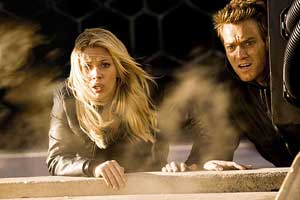 satisfaction until the day that I die. Otherwise, gosh, how boring. I mean, it’s good to feel satisfied, but I never want to stop looking or stop being curious about things. I think that you can get to a point in your life where you’re comfortable with that, but I never want to be comfortable like that, not too comfortable. I’m saying that now of course as a 20-year old girl. Ask me in another 35 years and I’ll probably tell you that all I want to be is comfortable. That’s my perspective on it now anyway.
satisfaction until the day that I die. Otherwise, gosh, how boring. I mean, it’s good to feel satisfied, but I never want to stop looking or stop being curious about things. I think that you can get to a point in your life where you’re comfortable with that, but I never want to be comfortable like that, not too comfortable. I’m saying that now of course as a 20-year old girl. Ask me in another 35 years and I’ll probably tell you that all I want to be is comfortable. That’s my perspective on it now anyway.
Q: And Michael, how’s your treatment of actors?
MB: I care so much about the acting. Would you say I do?
Q: What’s it like working with Michael Bay?
SJ: He’s lovely. It’s funny because he’s so loud and just boisterous and rude.
MB: Blunt. Blunt. There’s a difference.
SJ: He’s got the explosions going and you see him as that, and then he’ll come up to you in a middle of a take and say, ‘Hey, you did this really cute thing that I wish you would do again.’ And he’ll get so excited about it. He was so excited that finally toward the end of the shooting that we finally got the meat of it. So it’s nice to have a director that’s so incredible with the effects call the actual drama of the movie the meat of the story. That’s rare. We had a lot of fun with that because we had a lot of great private moments between the Lincoln and the Jordan characters.
Q: When did you finish?
MB: About 48 or 72 hours ago.
Q: Why the disparity between rich and poor?
MB: The whole philosophy was that this is a military bunker. It’s in the desert. These [workers] live out in the desert. They don’t make a lot of money. They have these people who birth these clones. They’re like truck drivers birthing these clones. When we were shooting that scene (where the clones are birthed) there was something about it that was so wrong. This facility, the concept was that it’s going to start off that rich people could afford it and hopefully one day it would get cheaper, like when you buy a DVD recorder. It starts coming down in price the more you do it. As you may have noticed, I had a lot of foreigners in it. There was an old Japanese guy in it. He looks like a guy who runs Tokyo bank. You noticed we had a lot of tall guys there. Those are the (pro) basketball players.
Q: What did you think about this subject matter in our current culture–is there a desire to get cloned?
SJ: I thought that it was practical regarding the story that we were trying to tell. When you see the people coming in looking to sponsor a clone of themselves that they all look like wealthy businessmen and athletes.
MB: I put a rapper in there.
SJ: And of course you see Michael [Clarke Duncan]. Michael is a football player. It’s people that we think in our rational minds that could afford this $2 million or $5 million policy. I thought that it was very much what it was supposed to be. It didn’t seem radical.
Q: What is the movie trying to say?
SJ: I don’t believe that movies should deliver messages. I never pick films based on whatever messages they’re delivering. I think that when you leave the theater I think that you question, ‘How far would I go to test fate?’ But after all when I come out of a film that I’ve just paid $10 to see and spent $15 bucks on 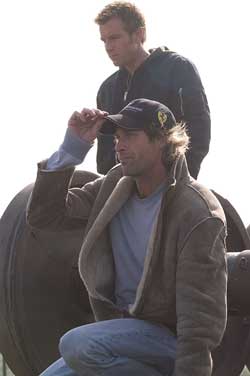 popcorn, when I come out of the theater at the end of it I just want to be entertained. I just want to leave and say, “That was cool. I had a great time. That was a fun experience for me.” I don’t really feel that films necessarily always have to deliver the big picture. That can be so boring particularly if you find it to be offensively preachy. I just hope that people have a great time when they watch it. It’s a trip.
popcorn, when I come out of the theater at the end of it I just want to be entertained. I just want to leave and say, “That was cool. I had a great time. That was a fun experience for me.” I don’t really feel that films necessarily always have to deliver the big picture. That can be so boring particularly if you find it to be offensively preachy. I just hope that people have a great time when they watch it. It’s a trip.
Q: And what do you like most about this film?
SJ: It’s nice because it slowly starts to build, it gets psychologically creepier and creepier as it goes and then once you hit that point where everything is revealed and you see Michael and he’s struggling for his life it’s so horribly disturbing, it’s so, so, so disturbing that from that moment on it just doesn’t stop and that’s the ride that you take.
Q: Michael. how do you top yourself from picture to picture especially in shooting so quickly?
MB: I shoot quickly. That’s the scariest part of my job. I don’t know how many people drive to work thinking I hope someone doesn’t die today. That’s how you have to think. You have to think. It’s always the little things that can hurt someone.
Q: How much pressure do you put on yourself?
MB: Oh. With action, I keep trying to challenge myself. On this story, I was trying to challenge myself by doing a much slower build. It hurts not being able to do the action in the beginning. I forced myself not to. I drew it out for 30 minutes. I love how the switch happens and the movie takes off. You think, is the audience going to get bored? This younger generation wants things to be faster. Hopefully they’re going to like the beginning of this movie. It seems like the audiences that have seen it like the innocence and the subtext. I love that when you watch the movie you’re thinking there’s something wrong but I can’t put my finger on it. Please don’t give it all away.
Q: Scarlett, you seem to be working non-stop you’ve got A Good Woman in September or October, Match Point coming for Christmas, and you are making the new Woody Allen movie now. It seems like you are doing six movies a year…Are you a clone or a robot and do you have some kind of a life.
SJ: If I had a clone I would never do the press junket. No, that way I could sleep in, get my eggs Benedict, that kind of thing. But I am definitely going to take a nice long much needed rest after this one I have promised myself that. The problems is once I start to relax for a while I get very anxious and then I have to do something, so I am either going to have to find some different kind of career path or just go to some far away island and have silent torture sessions of myself about why I am not working. It’s hard for me to take vacations.